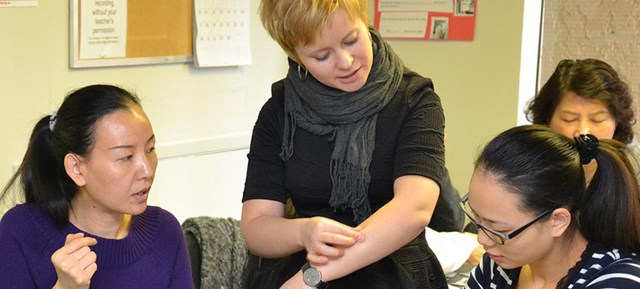The burgeoning waiting list for English language classes in Richmond is about to get even bigger — after a round of federal government funding cuts.
Both the Immigration Services Society of BC (ISSBC) and SUCCESS — which run the non-profit Language Instruction for Newcomers to Canada (LINC) programs — are in the process of figuring out how to deal with the reduction.
The programs are funded by the government and free of charge to new residents to the country.
ISSBC, which runs the LINC classes from its Alexandra Road and Cedarbridge Way offices in Richmond, told the News the program is facing a nine per cent funding cut and will have to slice at least two of its current 21 LINC classes.
The forced closure is expected to impact the service, where the waiting list for basic English classes already has 335 people.
“We also received supplementary Syrian funding from IRCC (Immigration, Refugees and Citizenship Canada); however, as the amount of supplementary funding received is limited, we are still facing close to a nine per cent cut,” Diana Smolic, ISSBC’s division manager for the LINC program, said in an emailed response to the News.
“We already have long waitlists for our LINC classes in Richmond and by reducing the number of (classes being offered), we expect longer waits for clients to access LINC classes.”
Demand is highest in general, added Smolic, for the service’s CLB (Canadian Language Benchmarks) 1-4 (basic) classes.
“At our Richmond site, we offer classes from CLB 1-6 and the current wait period to start classes ranges from one month up to a year, with the average wait being three to six months,” she said.
“The wait is often longer for those clients who also need to access our onsite childminding services.”
In Surrey, where a large number of Syrian refugees are settling, the wait list at SUCCESS English classes currently sits at 1,300 people. According to CBC News, service providers have been told the federal government is reducing funding, based on landing numbers of immigrants and refugees in B.C.
They were also informed that funding is being redistributed proportionately, so other provinces where more newcomers are arriving, could see funding increases.
Steveston-Richmond East’s Liberal MP, Joe Peschisolido, told the News he wasn’t aware of any specific cuts to language programs in Richmond, citing the $335 million the government is spending over four years for refugee settlement.
“But if there are going to be specific cuts to programs, we will try to help with that, particularly if they’re in Richmond,” said Peschisolido.
“There are always adjustments based on the needs (across the country) and it’s still very much a work in progress.
“This is just the beginning of the process and it’s all very early. I would be more than happy to sit down with the organizations in question to see what I can do to help.”
Earlier this month, Peschisolido backed Immigration Minister John McCallum’s tabling of a bill to repeal stricter language requirements for some immigrants, imposed by his Conservative predecessor.
The new legislation is part of a package of several other changes to the Citizenship Act.
“You want to make it fair for the folks and fair for the community where you have people coming in and (trying to speak) English,” Peschisolido said almost two weeks ago.
McCallum has proposed that age requirements for an “adequate knowledge” of one of the official languages be loosened.
Last year, under the Conservative government, Bill C-24 expanded the age range for people required to take language proficiency tests from 18-54 years of age to 14-64.
Peschisolido said the move would make it easier for families to unify. He noted under the Conservative changes his “nonno and nonna,” who came from Italy, would have had a difficult time settling in Canada.



